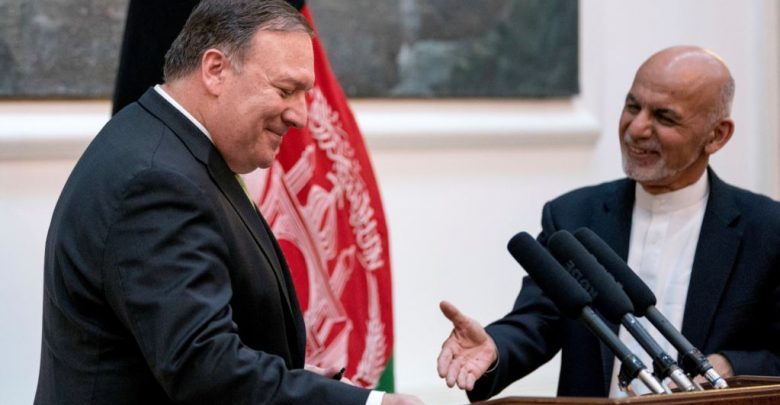
By Nasir Shansab:
There is a simmering turmoil in Washington about how to end America’s longest war without Afghanistan descending immediately into uncontrollable chaos ⸺ a situation that would reinforce the widespread perception abroad that America doesn’t know what it’s doing. Whenever, the argument goes, the U.S. interferes in other countries, it leaves destruction and an unsolvable mess behind. The worry is that exactly that might happen in Afghanistan when, and if, the present exit negotiation with the Taliban succeeds.
There is some talk that Secretary Pompeo is reluctant to sign the “agreement in principle” which Zalmay Khalilzad has concluded with Taliban representatives in Doha. If true, I couldn’t agree more with the Secretary. However, my disagreement concerns not merely the “agreement in principle.” My objection includes the process itself.
I’m stating my objection not frivolously. I’m doing so with a heavy heart. I returned from Afghanistan about a month ago. I was there for about three months, making trips to several regions of the country and firmly concluding that the Afghan people urgently need peace and security.
If I had been convinced that Mr. Khalilzad’s effort would lead to peace, I would support his effort. But I am not. I am afraid this strategy will fail as all prior U.S. strategies in this war have flunked. The reason, in my view, is simple: Washington has listened to, partnered with, and empowered the wrong people.
In the Bonn conference, which had been convened to form the post-Taliban government, the U.S. relied on Mr. Khalilzad, an Afghan-American who, in the 1980s, had forged close relations with some members of Pakistan-based resistance groups fighting the Soviet Union, among them Hamid Karzai who worked for one of the resistance organizations.
Since the military campaign within Afghanistan progressed much faster than anyone had expected, the need to install a government in Kabul became a matter of utmost importance. It was Mr. Khalilzad who chose his friends to form the government, without regard to ability and integrity, and made certain that his friend, Hamid Karzai, rose to the top.
Despite the cheering, the Bonn conference was a disaster. Khalilzad and Karzai delivered Afghanistan to the very warlords who had unleashed upon the Afghan people a brutal and destructive civil war. A study published by Oxford University concluded, “The Bonn agreement in 2001 did not usher in an effective constitutional moment because it enabled a personalized division of spoils rather than an institutionalized division of power.”
The majority of the chosen leaders had risen to power through the chaos of civil war. They were the product of mayhem and abhorred the rule of law. They unleashed a corruption-ridden bureaucracy and instigated an imperial rule. Stealing of funds the U.S. provided for the reconstruction of Afghanistan became the norm. They became enormously wealthy and powerful by rebuilding their private armies.
This system of personal power and lack of institutional capacity developed while Mr. Karzai was Afghanistan’s president, and Mr. Khalilzad spent almost every day in the presidential palace. Together, they masterminded a Kalashnikov culture and endemic corruption which, despite American generous monetary and military support over 18 years, doomed Afghanistan to remain a failed state.
To leave Afghanistan at this stage would end up in another disaster. It would see the country descent into a destructive civil war, creating one more center of unmanageable mayhem.
The more appropriate way of terminating America’s longest war would be for Washington to assume hands-on control of Afghanistan’s two vital areas: The country’s economic revitalization and the democratization and strengthening of its institutions.
Enabling the country to have a stable enough economy to wean itself off of its present need for outside financial support would be an essential step for the country to survive on its own. The democratization and strengthening of its institutions would enable the people to withstand the unsavory methods of violence-prone warlords.
This, I believe, should not take more than 3 to 4 years and should, with the write people involved, cost much less than what has been spent in the past years.
With strong and functioning institutions in place, parliamentary and presidential elections could be arranged. And the Taliban could participate in them as a separate and recognized political entity.
With proper supervision, the elections could be free and much less, if at all, fraudulent, as has been the case in the past 18 years.
Nasir Shansab was born in Afghanistan, attended boarding school and college in Europe, and after finishing his education returned to a very successful Afghanistan business. In 1975, Shansab’s family was forced to leave Afghanistan; Shansab lived in Germany for five years and then moved with his family to the Washington, D.C. area in 1980. A longtime U.S. citizen, Shansab is the author of books on Afghanistan including “Silent Trees: Power and Passion in War-Torn Afghanistan."





Leave a Reply
Thank you for your response.
Please verify that you are not a robot.